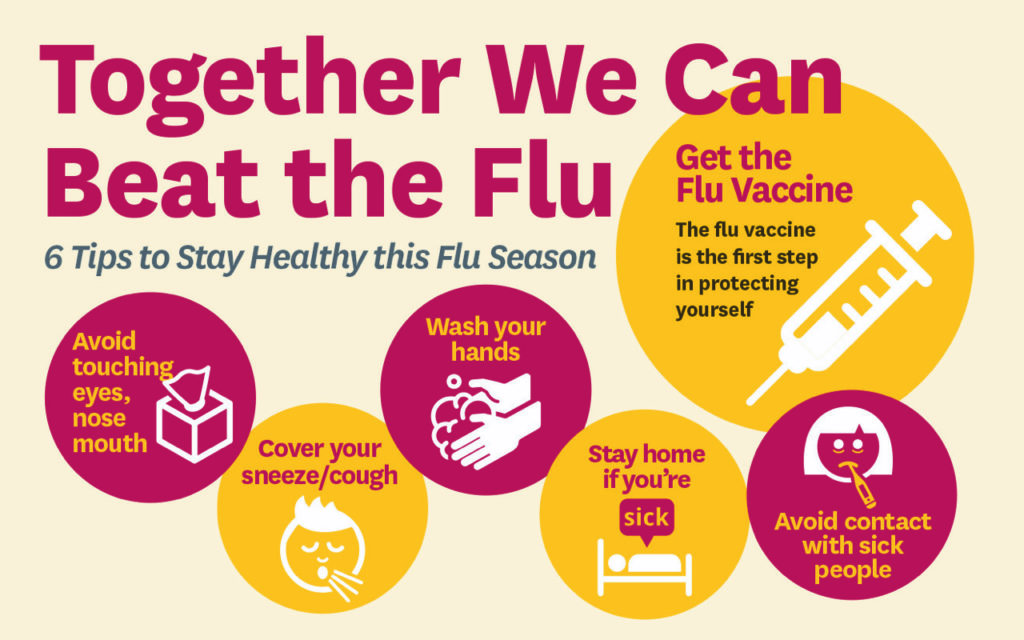流感疫苗知多少

流感疫苗知多少
上次我们介绍了普通感冒,今天我们聊聊流感,即由流感病毒引起的流行性感冒。普通感冒可以通过日常良好的生活习惯来预防,保证免疫力不下降就能基本抵挡病毒,即使感冒了也很快就能康复,但流感不同,它一旦流行起来整个社会都会瘫痪,危害较大。重型流感除了比普通的伤寒感冒来的更凶猛,症状更严重以外,还可引起病毒性肺炎,尤其在老年人、慢性病人及小孩身上易导致呼吸困难,甚至缺氧,且目前尚无特效的抗病毒药物。流感的另一危害是加重原有的慢性病,包括心脏病、肺炎、肾脏疾病和糖尿病等,导致相应器官功能的衰竭。

根据美国疾病控制和预防中心(CDC)的信息,流感病毒可以从咳嗽、喷嚏或交谈的飞沫中传播达六英尺(合1.83米)远。有时,流感也会通过触摸到被污染的表面、进而又接触到眼睛、鼻子或嘴来传播。感染者在没有出现症状的时候就开始传播病毒,并持续到症状消失5到7天以后甚至更久。
由于流感病毒可以感染全人群,所以世界卫生组织(WHO)总的原则是鼓励所有人接种流感疫苗。接种流感疫苗是目前世界公认的预防流感最为有效的措施。美国疾病控制与预防中心(CDC)建议所有大于六个月的小孩及大人,除非特殊情况,最好每年都按时接种流感疫苗。尽管流感疫苗并不能完全避免流感,很多人在接种疫苗后还是可能患上流感,但流感疫苗可以减轻疾病的严重程度,降低病死率,并预防传染给他人。这就是所谓的“群体免疫”, 即越多的人接种流感疫苗或其他特定疾病的疫苗,会大大降低该疾病的传染性,即使那些不能接种疫苗的人(如免疫功能低下的癌症、艾滋病患者)也因此受到了保护,如果一人患病,由于群体免疫降低了疾病的传染,造成疾病爆发的机会便大大减少了。因此,越多的人接种疫苗,越少的人患病,整体人群的健康便大大提高了。

下面是美国疾病控制和预防中心(CDC)有关流感疫苗的详细信息:PDF files
网络链接如下:https://www.cdc.gov/flu/
What Should We Know About the Flu?
Flu is the influenza caused by the flu virus. As we know, the common cold can be prevented by daily good habits. People usually recover very quickly from the common cold, unless you are immunocompromised. But the flu is different. Once it spreads and becomes prevalent, it will be very harmful, lead to an outbreak, from which the whole society might be paralyzed. Compared with common cold, it causes more severe symptoms, sometimes resulting in serious complications, such as bronchitis, even pneumonia, especially in the elderly, patients with chronic disease, and children, which may lead to difficulty breathing or even hypoxia. there is no specific effective antiviral medications. and there is no special effect at present. Another hazard of the flu is to aggravate the original chronic diseases, including heart disease, pneumonia, kidney disease and diabetes, leading to organ failure.
According to US Centers for Disease Control and Prevention (CDC), influenza viruses can spread up to about 6 feet (1.83 meters) away from the droplets of coughing, sneezing, or talking. Sometimes the flu spreads by touching the contaminated surface, and then touching the eyes, nose or mouth. The infected person begins to spread the virus one day before symptoms develop, and up to 5 to 7 days after being sick. Children and some people with weakened immune systems may pass the virus for longer than 7 days.
Since the flu virus can spread to the entire population, the general principle of the World Health Organization (WHO) is to encourage everyone to get a flu shot. Flu vaccine is currently the most recognized effective measure to prevent influenza in the world. The CDC recommends that everyone 6 months of age and older get a seasonal flu vaccine every year, unless otherwise circumstances. Although the flu vaccine does not completely prevent the flu and many people may still get the flu after vaccination, the flu vaccine can reduce the severity of the disease, reduce the mortality rate, and prevent transmission to others. This phenomenon is called “community immunity” or “herd immunity”. When enough people are vaccinated against flu or other certain disease, the flu virus or other germs can’t travel as easily from person to person, and the entire community is less likely to get the disease. Even people who can’t get vaccinated, like those immunocompromised people with cancer, HIV/AIDS, will have some protection from getting sick. and if a person does get sick, there’s less change of an outbreak because it’s harder for the disease to spread. So, the more people are immune to the flu, the fewer people will become ill, and the overall health of the population will increase.
The following is some important information about inactivated flu vaccine from the US CDC:PDF files Website links as below:https://www.cdc.gov/flu/

